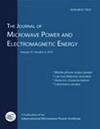Editor’s message: about Artificial Intelligence as a tool for writing papers
IF 1.5
4区 工程技术
Q4 ENGINEERING, CHEMICAL
Journal of Microwave Power and Electromagnetic Energy
Pub Date : 2023-04-03
DOI:10.1080/08327823.2023.2204648
引用次数: 0
Abstract
Artificial Intelligence (AI) has become a trendy topic through advertisements, notes and even warnings about it, claiming that it can be used to answer almost any kind of question. Although we did not use to call it AI, we are somehow familiar with the concept of having computers answering tough inquiries as it can be seen in several science fiction stories, where they predict scenarios and help people to make decisions. In some cases, computers portraying certain personality were shown, but most of them did not imitate human intelligent behavior. Probably robots built with positronic brains were the only ones exhibiting such actions, but they still belong to the science fiction universe, hence there are no details on how they work to mimic human like thought. Modern AI consists in algorithms running by computers to simulate human capacity for learning, understanding, reasoning, and deducting. These are not isolated abilities since they conform a system which includes gathering data, analyzing, and reaching to conclusions. In many cases, worthiness perception of this intelligence depends on its applicability. The IA features have been described by many reporters and social media, claiming its great feats in forecasting scenarios, answering questions, and performing some tasks, as they were carried out by intelligent flowless humans. Therefore, as soon as IA applications (software) became readily available, a lot of tests follow up. Some are pursuing a quite serious interest in learning more about this technology and its capacities, while others are just driven by curiosity. Several opinions have emerged from the news and reports of the users, so that there are enthusiastic people who see a powerful tool that might help professionals to perform their tasks, better or faster, in opposition to others who are afraid of its probable misuse, proposing that it should be banned. This response could be compared to the automation technology, that nowadays uses AI for controlling machines while performing programmed instructions. The automatic devices include, but are not limited to, house appliances, manufacturing machines, service machines, and vehicles. This technology that might be controversial has matured so that it is not questioned and seems naturally employed. Perhaps a point of concern with AI is that it is supposed to perform intellectual rather than hard work, although AI exists in all kinds of apparatus and gadgets with the smart adjective. Among the intellectual applications of AI that are becoming an attractive interest is writing. We are wondering if AI can really produce new documents, write essays, and do the homework of the students or anyone who wants to produce written material. The articles attributed to AI, demonstrating congruence resembling human work, are aimed to general topics and comments about markets, sports, and other events, where their originality is based on the quality of the compilation presented as a single easy to read document. Therefore, despite the absence of contribution parameters, there are comments supporting that AI can write something new by collecting written material from diverse sources, select proper paragraphs, and assemble them accordingly to a set of rules that involves accuracy of the employed keywords.编者的话:关于人工智能作为写论文的工具
人工智能(AI)已经成为一个时髦的话题,通过广告、笔记甚至警告,声称它可以用来回答几乎任何类型的问题。虽然我们过去不称之为人工智能,但我们对让计算机回答棘手问题的概念并不陌生,因为它可以在一些科幻小说中看到,在这些小说中,它们预测场景并帮助人们做出决定。在某些情况下,展示了描绘某些个性的计算机,但大多数计算机并没有模仿人类的智能行为。也许只有拥有正电子大脑的机器人才会表现出这样的行为,但它们仍然属于科幻小说的世界,因此没有关于它们如何模仿人类思维的细节。现代人工智能包括由计算机运行的算法,以模拟人类学习、理解、推理和演绎的能力。这些都不是孤立的能力,因为它们符合一个系统,包括收集数据、分析和得出结论。在许多情况下,这种智力的价值感知取决于它的适用性。许多记者和社交媒体都描述了人工智能的功能,声称它在预测场景、回答问题和执行一些任务方面的伟大成就,因为它们是由智能的无流程人类完成的。因此,一旦IA应用程序(软件)变得可用,就会有大量的测试跟进。一些人对更多地了解这项技术及其能力非常感兴趣,而另一些人则只是出于好奇心。从用户的新闻和报道中出现了几种观点,因此有热情的人看到了一个强大的工具,可以帮助专业人员更好或更快地完成任务,而另一些人则担心它可能被滥用,建议应该禁止它。这种反应可以与自动化技术进行比较,即现在使用人工智能来控制机器,同时执行编程指令。自动装置包括但不限于家用电器、制造机器、服务机器和车辆。这项可能会引起争议的技术已经成熟,因此它不会受到质疑,似乎很自然地被采用。也许人们对人工智能的一个关注点是,它应该执行智力工作,而不是艰苦的工作,尽管人工智能存在于各种各样的设备和小工具中,带有智能的形容词。在人工智能的智能应用中,写作正成为一种吸引人的兴趣。我们想知道人工智能是否真的可以生成新的文件,写文章,并为学生或任何想要生成书面材料的人做作业。归因于人工智能的文章,展示了与人类工作的一致性,针对的是关于市场、体育和其他事件的一般主题和评论,其中它们的原创性基于作为一个易于阅读的文档呈现的汇编的质量。因此,尽管没有贡献参数,但有评论支持AI可以通过从不同来源收集书面材料,选择适当的段落,并根据一套涉及所使用关键词准确性的规则将它们组合起来,从而写出新的东西。
本文章由计算机程序翻译,如有差异,请以英文原文为准。
求助全文
约1分钟内获得全文
求助全文
来源期刊

Journal of Microwave Power and Electromagnetic Energy
ENGINEERING, CHEMICAL-ENGINEERING, ELECTRICAL & ELECTRONIC
CiteScore
2.50
自引率
6.70%
发文量
21
期刊介绍:
The Journal of the Microwave Power Energy (JMPEE) is a quarterly publication of the International Microwave Power Institute (IMPI), aimed to be one of the primary sources of the most reliable information in the arts and sciences of microwave and RF technology. JMPEE provides space to engineers and researchers for presenting papers about non-communication applications of microwave and RF, mostly industrial, scientific, medical and instrumentation. Topics include, but are not limited to: applications in materials science and nanotechnology, characterization of biological tissues, food industry applications, green chemistry, health and therapeutic applications, microwave chemistry, microwave processing of materials, soil remediation, and waste processing.
 求助内容:
求助内容: 应助结果提醒方式:
应助结果提醒方式:


